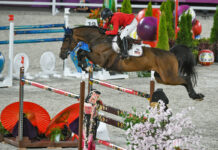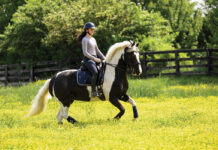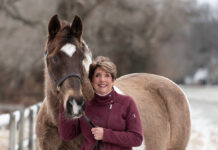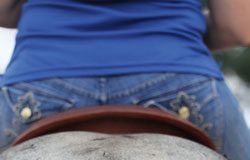
Throughout the year, we’ve been focusing on your physical fitness and strength, but there’s a very important aspect to riding horses that we can’t ignore: the mental side of it.
“Mental toughness, to me, has to do with being prepared,” explains Tonya Johnston, a hunter/jumper rider and mental skills coach who has been working with equestrians for more than 20 years. “[That way] when you’re competing, you stay completely in the moment and trust yourself to ride on instinct and feel.”
As with any sport, being mentally fit is important because it allows you to push yourself, push boundaries and become a better rider. What we allow ourselves to think and speak creates the world around us: if you think negatively about a course or a pattern, you will perform it poorly. You horse can also sense your mood, which can set up either a good or bad ride.
Building Piece by Piece
When it comes to establishing mental strength, Johnston points out that self-awareness is the biggest building block for mental toughness. Understanding the circumstances that led to how your ride went that day is vital.
“One of the best ways to focus on self-awareness and beginning to build it is by keeping a journal or log of your rides,” says Johnston.
Write down details of what you did before you rode. Did you sit down and eat an apple before tacking up? Or did you give yourself some quiet time before grabbing the saddle? Johnston believes that doing some reflection after your rides will help you build awareness. Also, if you’re able to, have your ride videoed so you can walk yourself through it later.
If you’re looking to improve on your performance in the show ring, Johnston recommends starting a pre-ride routine and keeping it consistent. Not only does this include getting yourself dressed and your horse tacked up, but also walking down to the ring, visualizing your ride and practicing some breathing work.
New routines like this can be practiced at home with dress rehearsals—all the way to wearing your show clothes, warming up in one arena, and then going to another to simulate a class.
“You want to ride in the moment at home, and at the show, without constantly critiquing yourself and evaluating the ride as you go,” says Johnston.
Keeping Goals in Mind
In order to evaluate your rides, you need to have your goals in mind at all times. The goals don’t have to be extravagant, like winning a world championship in your breed. In fact, experts say the best goals are easily attainable ones that you can use as steps towards a larger one.
For example, if you’re preparing for a show with your new horse but your larger goal is to win a year-end championship, you might want to start with a goal of smoothly getting through your first classes to get the edge off. Follow this with a goal of having a clear round without any glaring mistakes. Smaller goals are like steps on a staircase.
Mary Meneely, coach of the women’s equestrian team at Auburn University, likes to tell her riders something she borrowed from her son’s football coach: “Win each day,” says Meneely. “In everything you do, you need to do your absolute best—push yourself, surround yourself with individuals that push you. Make great choices in life and be of service to others.”
Her explanation is that what you do outside the ring in your everyday life affects you inside the ring. You can’t be a top rider if you’re not working to be a better person at work, at home or in general. It’s a trickle-down effect.
“Push yourself—ride an extra hour beyond your lessons, add an extra lap without your stirrups—even when you don’t want to,” Meneely continues. “You will become tough. You will be training your mind to quiet down because you’re out to do what you set your mind on doing.”
Write your goals down on sticky notes and post them where you’ll see them frequently: the bathroom, tack room, your horse’s stall, the visor of your car, et cetera. Daily affirmations will help strengthen your resolve to do better, and your mindset will be more focused.
As Johnston likes to say, “Success is not a destination, it’s the road. It’s the hard work and walking your talk every day.”
This article originally appeared in the October 2016 issue of Horse Illustrated magazine. Click here to subscribe!







That was one of the most helpful articles I have read about mental fortitude!